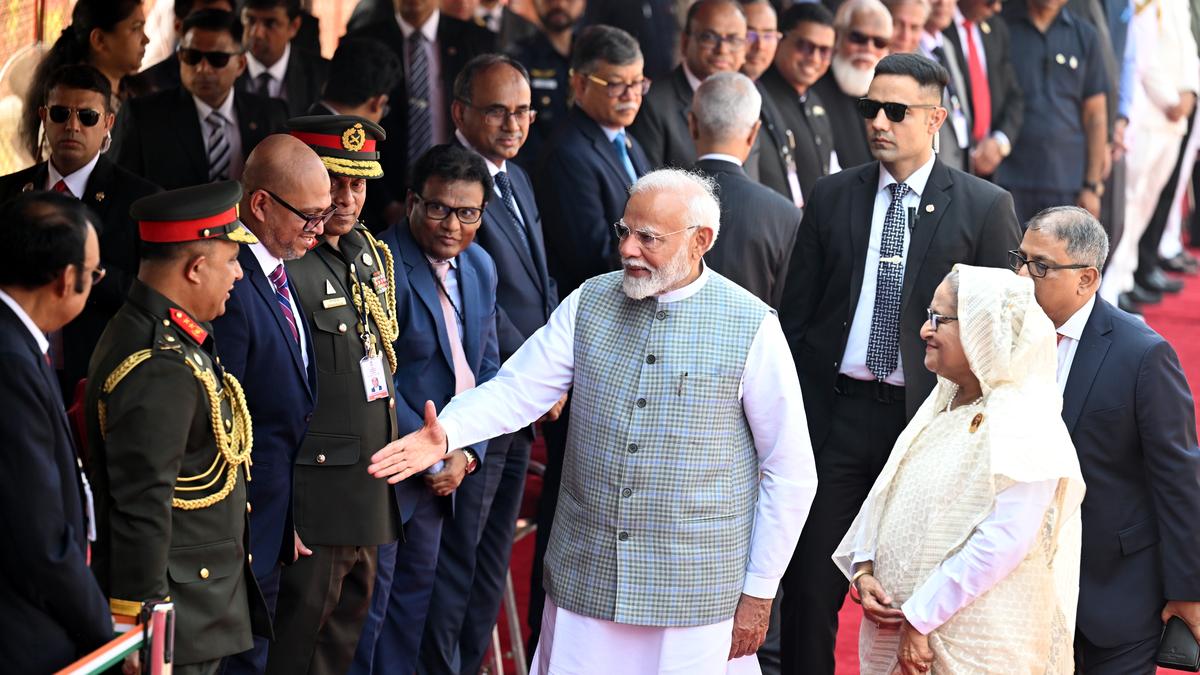
India planning inter-State train service through Bangladesh
The Hindu
India and Bangladesh agreed to begin a dialogue on a CEPA paving the way for broader economic ties between the two neighbouring economies.
India and Bangladesh on Saturday agreed to begin a dialogue on a comprehensive economic partnership agreement (CEPA) paving the way for broader economic ties between the two neighbouring economies.
In his welcome remarks delivered at the Hyderabad House, Prime Minister Narendra Modi said the two sides will intensify connectivity and energy collaboration, and announced that trade between the two countries is being conducted in the Indian currency.
“Between Akhaura and Agartala, the sixth India-Bangladesh cross-border rail link has been started. Cargo facility for India’s northeastern States has been started through the Khulna-Mongla Port. Mongla Port has been connected by rail for the first time. Both units of the 1,320 mega watt Maitree Thermal Power Plant have started generating electricity. Trade in Indian Rupee (INR) has started between the two countries,” Mr. Modi said.
Prime Minister Sheikh Hasina arrived here on Friday on a two-day visit, the first state visit by a foreign leader since Prime Minister Narendra Modi took charge for the third term on June 9. The two sides signed multiple MoUs covering maritime cooperation and economy, rail connectivity, oceanography, health and disaster management among others. Elaborating on the MoU on railway connectivity that was exchanged on Saturday, Foreign Secretary Vinay Mohan Kwatra said that apart from the six existing cross-border railway links between the two countries, the document focuses on “transit that they afford between different parts of India through the territory of Bangladesh.”
“The connectivity essentially strengthens a very large part of economic infrastructure within Bangladesh. It’s effectively a connectivity paradigm that benefits both the countries, both the societies, both the economies, very extensively,” said Mr. Kwatra explaining that “sub-regional transit that Bangladesh would get to Bhutan and Nepal would be further expanded and strengthened.” It is understood that India will attempt to run a train service in the near future that will connect north-eastern States like Tripura with West Bengal through the territory of Bangladesh.
Welcoming the leader of Bangladesh, Mr. Modi announced that India will open an Assistant High Commission in Rangpur in the northern part of the country. Rangpur, which is strategically located between West Bengal and Assam, is also important as it is nurtured by the waters of the Teesta, which is a matter of protracted negotiation between India and Bangladesh. India’s Deputy High Commissioner sits in the High Commission in Dhaka and therefore the mission in Rangpur will be a subsidiary office, sources here said.
During the event in Hyderabad House, Mr. Modi announced that a technical team from India will soon visit Bangladesh to discuss “conservation and management of the Teesta river”. In the backdrop of stalled negotiations on the sharing of the waters of the Teesta, Bangladesh came up with the project to conserve Teesta and subsequently, the project drew interest from New Delhi. The project is also likely to feature in the agenda when Ms. Hasina visits China next month, as China too has displayed interest in the project regarding the cross-border river













